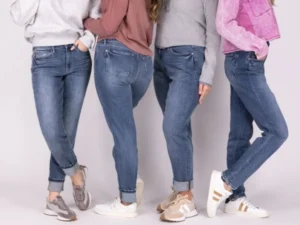In an era where sustainability is no longer just a trend but a necessity, we are excited to announce that we now offer GRS-Certified denim fabric. This significant milestone underscores our commitment to eco-friendly practices and responsible manufacturing. Below, we delve into what the Global Recycled Standard (GRS) entails, its importance, and how it revolutionizes the denim industry.
Understanding GRS: The Global Recycled Standard
The Global Recycled Standard (GRS) is an international, voluntary, and full product standard that sets requirements for third-party certification of recycled content, chain of custody, social and environmental practices, and chemical restrictions. Managed by Textile Exchange, a global non-profit organization, GRS ensures that products made from recycled materials meet stringent environmental and social criteria throughout their supply chain.
The primary objectives of GRS are:
– To provide a traceable method to substantiate claims about recycled content in products.
– To reduce the harmful impact of production on people and the environment.
– To ensure that products are processed more sustainably and responsibly.
Importance of GRS Certification
The significance of GRS certification extends beyond merely having a label. It represents a comprehensive approach to sustainability and ethical manufacturing. Here are key reasons why GRS certification is crucial:

- Verification of Recycled Content
GRS certification provides a credible way to verify the recycled content in our denim fabric. This ensures transparency and builds trust with consumers who are increasingly prioritizing sustainability in their purchasing decisions.
- Sustainable Resource Utilization
By confirming the use of recycled materials, GRS certification helps reduce the dependence on virgin resources. This not only conserves natural resources but also lowers the environmental footprint of our products.
- Ethical Manufacturing Practices
GRS sets stringent requirements for social and environmental practices. This means our production processes are not only environmentally sound but also socially responsible. Ethical manufacturing ensures fair labor practices, safe working conditions, and respect for workers’ rights.
- Environmental Impact Reduction
The use of recycled materials in our denim fabric contributes to waste reduction and promotes a circular economy. This helps lower greenhouse gas emissions, reduce landfill waste, and minimize overall environmental impact.
- Market Differentiation
GRS certification sets our products apart in a competitive market. As consumers and businesses alike become more eco-conscious, GRS-certified products are increasingly in demand, enhancing our market position.
The Journey to GRS Certification
Achieving GRS certification is a rigorous process that involves multiple stages of verification and compliance. Here’s a brief overview of what the process entails:
- Pre-Certification Assessment
An initial assessment is conducted to evaluate our current practices and identify areas that require improvement to meet GRS standards.
- Implementation of GRS Requirements
Based on the assessment, we implement necessary changes in our supply chain, including sourcing recycled materials, ensuring compliance with environmental and social criteria, and maintaining robust documentation and traceability.
- Third-Party Audits
Independent auditors conduct thorough inspections to verify compliance with GRS standards. This includes site visits, interviews with staff, and reviews of documentation and records.
- Certification and Ongoing Compliance
Upon successful completion of the audits, we receive GRS certification. To maintain certification, we undergo regular audits and continuously adhere to GRS requirements.
The Impact of GRS-Certified Denim Fabric
Introducing GRS-certified denim fabric into our product line has several far-reaching benefits:

- Consumer Confidence and Loyalty
With growing awareness about sustainability, consumers are increasingly looking for products that align with their values. GRS certification assures them of our commitment to sustainable practices, fostering trust and loyalty.
- Supply Chain Transparency
GRS certification necessitates a transparent supply chain. This means our customers can trace the journey of our denim fabric from recycled material to finished product, ensuring integrity at every step.
- Supporting a Circular Economy
By incorporating recycled materials, we contribute to a circular economy where waste is minimized, and resources are reused. This not only benefits the environment but also sets a precedent for other industries to follow.
- Environmental Stewardship
The adoption of GRS-certified denim fabric aligns with global efforts to combat climate change and environmental degradation. It reflects our proactive approach to reducing our carbon footprint and promoting sustainable development.
Conclusion: A Step Towards a Greener Future
The introduction of GRS-certified denim fabric is a testament to our dedication to sustainable and ethical manufacturing. As we continue to innovate and enhance our practices, we remain committed to providing high-quality, eco-friendly products that meet the evolving needs of our customers.
By choosing GRS-certified denim, you are not only investing in a superior product but also supporting a movement towards a more sustainable and responsible fashion industry. Together, we can make a significant impact and pave the way for a greener future.
Stay tuned for more updates as we continue our journey towards sustainability. For more information about our GRS-certified denim fabric, feel free to contact us or visit our website. Let’s embrace the future of fashion with sustainability at its core.
#GRSdenim #sustainabledenim #recycleddenim #denimfabricmanufacturing





